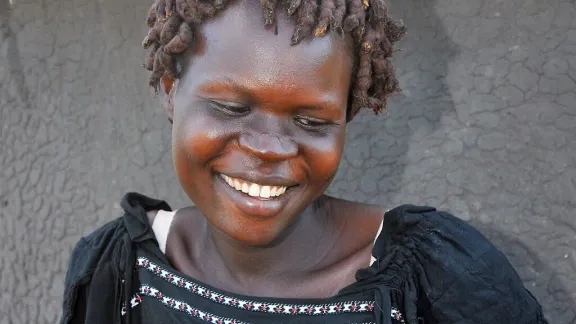
Alwel Violet (26) experienced child marriage and abuse from her husbandâs family. LWF helped her rebuild her life. Photo: LWF/ P. Kikomeko
ADJUMANI, Uganda/ GENEVA, 25 November 2016 (LWI) – “I did not have a say in whatever was arranged. The only time I had ever met the man I was supposed to marry was at family functions. I always thought he was one of those distant family members, we never talked more than a greeting,” Alwel Violet (26) recalls the first meetings with her future husband. She was eight years old at that time.
She did not know that his family had paid a bride price for her, and that the deal was sealed. As her friends went to school, spent their days playing house, developing skills in sports or drama, Violet learned she would soon be a wife. As other parents were teaching their children to do chores around the house, Violet’s parents were busy arranging their daughter’s wedding. When she was eight years old, Violet got married to a 24-year-old man.
Child marriages like these are common in central African countries. It is estimated that 52 percent of the women in Violet’s home country South Sudan are married between the ages of 15-19 years. Many are considerably younger, eleven or twelve year-old-girls that have just reached puberty. Even the case of an eight-year-old girl is not entirely unheard of in her community. The Lutheran World Federation (LWF) works in advocating against child marriage and supporting the women affected by the practice in South Sudan, Kenya and Uganda.
After the wedding, her husband took Violet to Kenya. Unlike many girls who are forced out of school when they marry, Violet was still allowed to continue her education. But as a married woman, Violet was expected to do her wifely duties. She would do all the house chores before going to school and when she came back, she was to cook and care for her husband. When she was 15 years old, in the fourth year of high school, Violet became pregnant. Her husband returned with her to his home village in South Sudan, where she gave birth to a baby girl.
I did not have a say in whatever was arranged. The only time I had ever met the man I was supposed to marry was at family functions. I always thought he was one of those distant family members.
Terror from the in-laws
When her husband died two years ago, Violet’s life turned into a nightmare. “His brothers never gave me time to mourn my husband. Right after the burial ceremony, they decided who would take over his family, including me.”
According to the local custom in South Sudan, a wife whose husband has died after paying the bride price passes into the ownership of one of his brothers, together with any children she might have. The decision fell on the oldest brother. “Since then, every night he forced me to sleep with him” she says. With time not only her oldest brother-in-law, but all five of her late husband’s brothers would frequently rape her.
When she tried to fight back they drugged her and abused her when she was unconscious. “They believed that since the bride price for me was paid they had the right”, Violet says. Eventually her brothers-in-law would only appear when they wanted to sleep with her. They never provided money or food for her or the child.
Protection, counselling, livelihood
“I had to survive,” Violet says. “I needed to support my child. That’s why I went secretly to a friend and asked for help. He suggested I flee to Uganda to escape them.” The friend paid her transport to the Ugandan border. In March 2014 Violet registered as a refugee and was transferred to Adjumani refugee settlement in Northern Uganda.
The family however tracked her down. One day the brothers-in-law showed up in her new home and tried to take Violet and her child back to South Sudan. At this point Violet decided to seek help from the LWF, who runs the Njumanzi reception center and is, among others, also in charge of protection in Adjumani refugee camp.
“I went to the LWF office and told the entire story,“ she recalls. “He promised to help me.” Violet was transferred to Boroli, a different settlement within the refugee compound and enrolled in LWF counselling sessions. When her in-laws found her again and attacked her, LWF helped her to report the case to the local police. Her in-laws have never bothered Violet again.
Helping others in turn
LWF helped her join a village saving and loan association, which enabled her to start up her own business. Three months after she came to Uganda Violet became one of the LWF’s incentive workers as a counsellor in the psycho-social department, where she now helps other women who share her fate.
“The counselling really helped me move on with my life,” she says. “I am living a better life now, and I am happily married to a man I love. Soon my daughter will be a big sister. I’m where I belong surrounded by people who love me and wish me well. Words can’t express how LWF helped me restore my life. I hope that I will be able to show my gratitude through the work I do for other women who are in the same situation I was in.”
Contribution by: Niona Agasha


